Pills, DUIs, a crash, amputation, a heart attack. Now 36, he's a world-ranked triathlete.
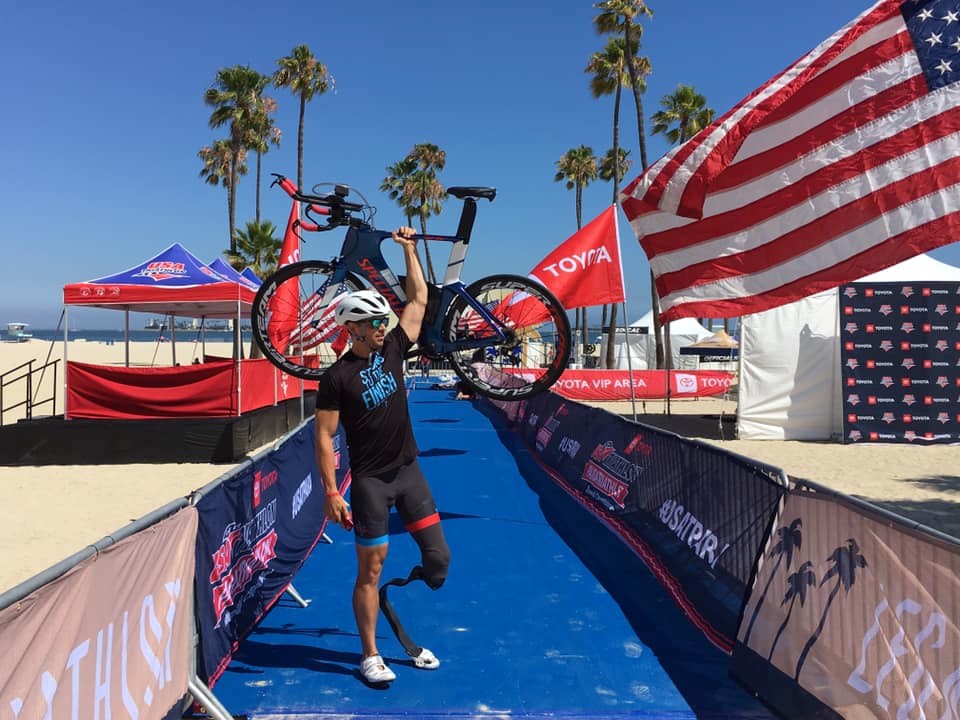 Uriah Steffen celebrates the finish of a triathlon.
Uriah Steffen celebrates the finish of a triathlon.
By Dana Hunsinger Benbow, IndyStar sports reporter
PLAINFIELD – Uriah Steffen stood inside the farmhouse he rented, a rustic and modest home that sat on a peaceful, rural patch of land. Inside the farmhouse, nothing was peaceful. Inside, an intense, devastating lifestyle carried on.
Mostly it was alcohol that consumed Steffen, but sometimes, pills from his past lingered, the ones that made him feel like a superhero, like he could do anything. There were mornings in that farmhouse that Steffen would get up for work and swallow the pills. They were perfect, tiny little allies to get him through the day. Nobody could smell the pills.
There were times in the farmhouse, he would slip back to marijuana, like he had so many times before, trying anything to get the feeling that life could be good, that life was actually worth living.
But always, Steffen turned to the alcohol. One drink after another inside the farmhouse where the only person who could smell his addiction was his wife, Angela.
Ten years ago, Steffen stood in that farmhouse in Plainfield having no idea that he was on the brink of sobriety. He had no idea that this would be the last day he would pop a pill or drown himself in alcohol, a combination that had become his best friend and worst enemy.
Angela Steffen stood in that farmhouse, to, looking into Steffen’s eyes with their marriage certificate in her trembling hands. Ready to rip it into pieces. They had been married only 19 days and Angela had something to say to her husband.
“I gave him an ultimatum. You either choose me and the life we can create,” she told Steffen, “or you choose alcohol.”
Angela knew who Steffen was, what his addictions were, when she fell in love and married him July 30, 2012. She knew of his DUIs and his arrests. She had watched him get handcuffed and escorted to a police car the year before. She knew he had been homeless more than once, living out of his truck.
And she had watched his drinking that started in high school go to extremes, the kind of extremes no one can imagine unless they live inside a farmhouse with a man who worships no higher god than the one of being drunk and high,
But inside that farmhouse 10 years ago, Steffen chose Angela as she stood holding their marriage certificate, a wedding vow to replace the one he had pledged in Las Vegas 19 days before. He chose God, Steffen said, not the god of drunk and high. He chose sobriety.
And sobriety would take over Steffen’s being. And sobriety would change his life.
Steffen is now a world-ranked triathlete, fourth in in the United States. He is the father of two girls, a mentor who has replaced his addiction to evils with an addiction to fitness and health.
Sobriety changed his life in unimaginable ways.
But first, before the good stuff, Steffen had other demons to face.
‘I wanted the nightmare to end’
Steffen had baggage, the loads of baggage that comes with years of addiction. He was sober in October 2012, two months after Angela had given him that ultimatum, but he didn’t have his driver’s license. He had lost that months earlier, after another DUI.
He began riding his bicycle to work.
On Oct. 15, 2012, on that bike, Steffen was hit head-on by a truck that was passing another vehicle on Moon Road outside of Plainfield. The truck’s driver didn’t see Steffen.
He was thrown into the air, landed on the hood of the truck and hit the windshield. He should have dies. But, somehow, his head cleared the roof of the vehicle with no impact.
His shoulder was dislocated down to his rib cage, stretching nerves and tendons in his left arm. The lower part of his left leg was severed. A small piece of skin and muscle tissue kept his foot attached to his ankle.
“I was just a mangled mess,” said Steffen, 36.
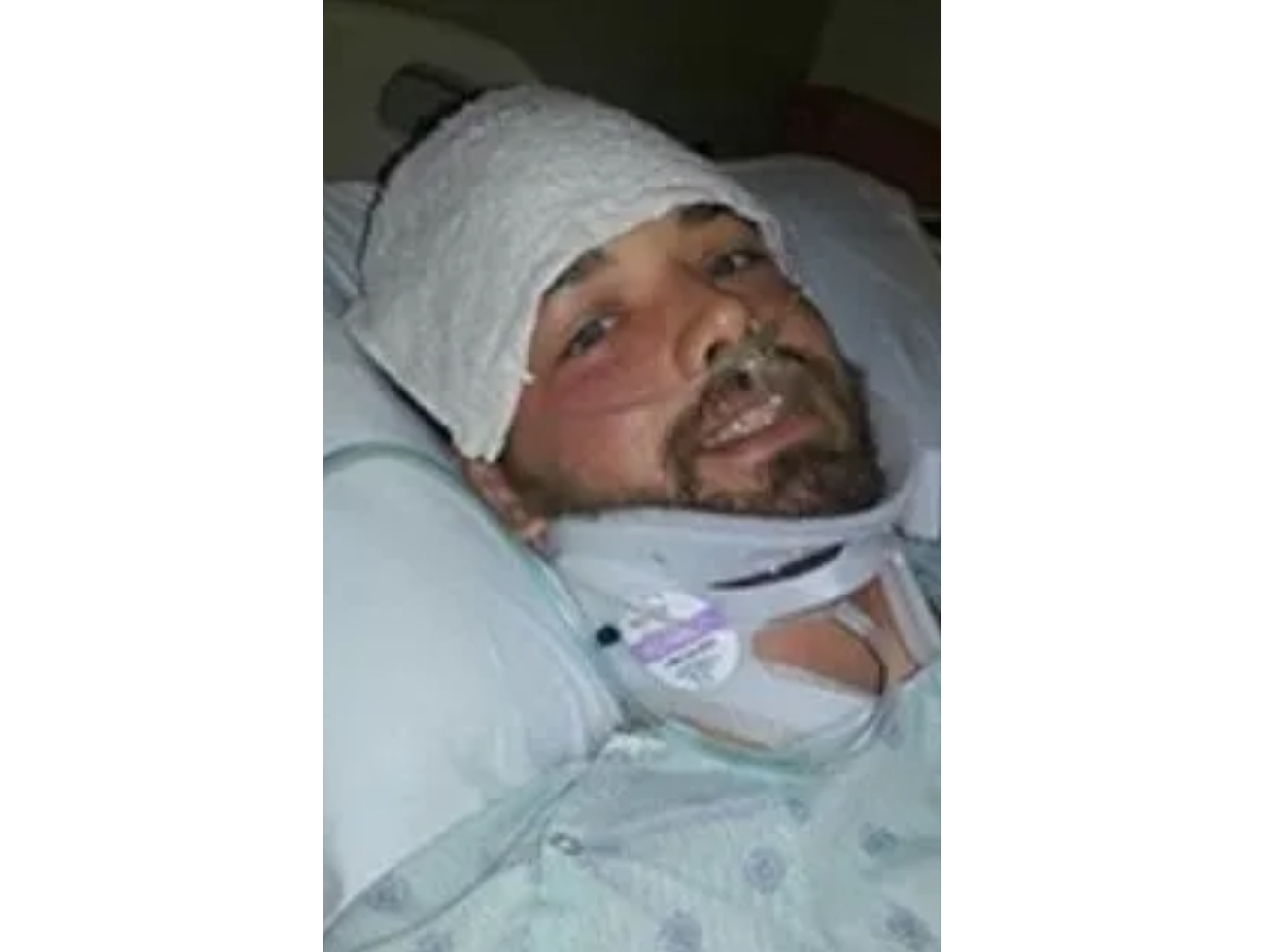 Uriah Steffen at the hospital in October 2012 after he was hit in a head-on collision by a truck.
Uriah Steffen at the hospital in October 2012 after he was hit in a head-on collision by a truck.
At the hospital, doctors and surgeons did everything they could. But they couldn’t do what Steffen wanted most. They couldn’t save his lower left leg. Steffen’s leg was amputated and, in the months that followed, he went through 15 surgeries, a year and half in and out of skilled nursing facilities. He couldn’t walk. He had relentless pain.
“While my drug of choice was pills, it was hard not to have the pills,” Steffen said. “The pain was intense.”
When he was alone at night, he struggled. Steffen calls it a perfect storm that made him wonder if life was worth living. A fight for sobriety, intense court-ordered counseling, the loss of his leg, infections, blood flow issues, the pain. Steffen said he went to a dark place.
“I was trying to understand why I was going through the hell I was in,” he said. “I felt like I was a Frankenstein project from the waist down. Scars, sutures, bolts. The dislocated shoulder that had lost nearly all muscle mass. I looked in the mirror and felt lopsided, less than human.”
There was only one thing Steffen really wanted if he had to be living on this earth. He wanted to get high.
And he couldn’t.
“I was just like, ‘what’s the point?’” Steffen said. “I had entered into a depression that I didn’t know how to get out of. I was ready to end it.”
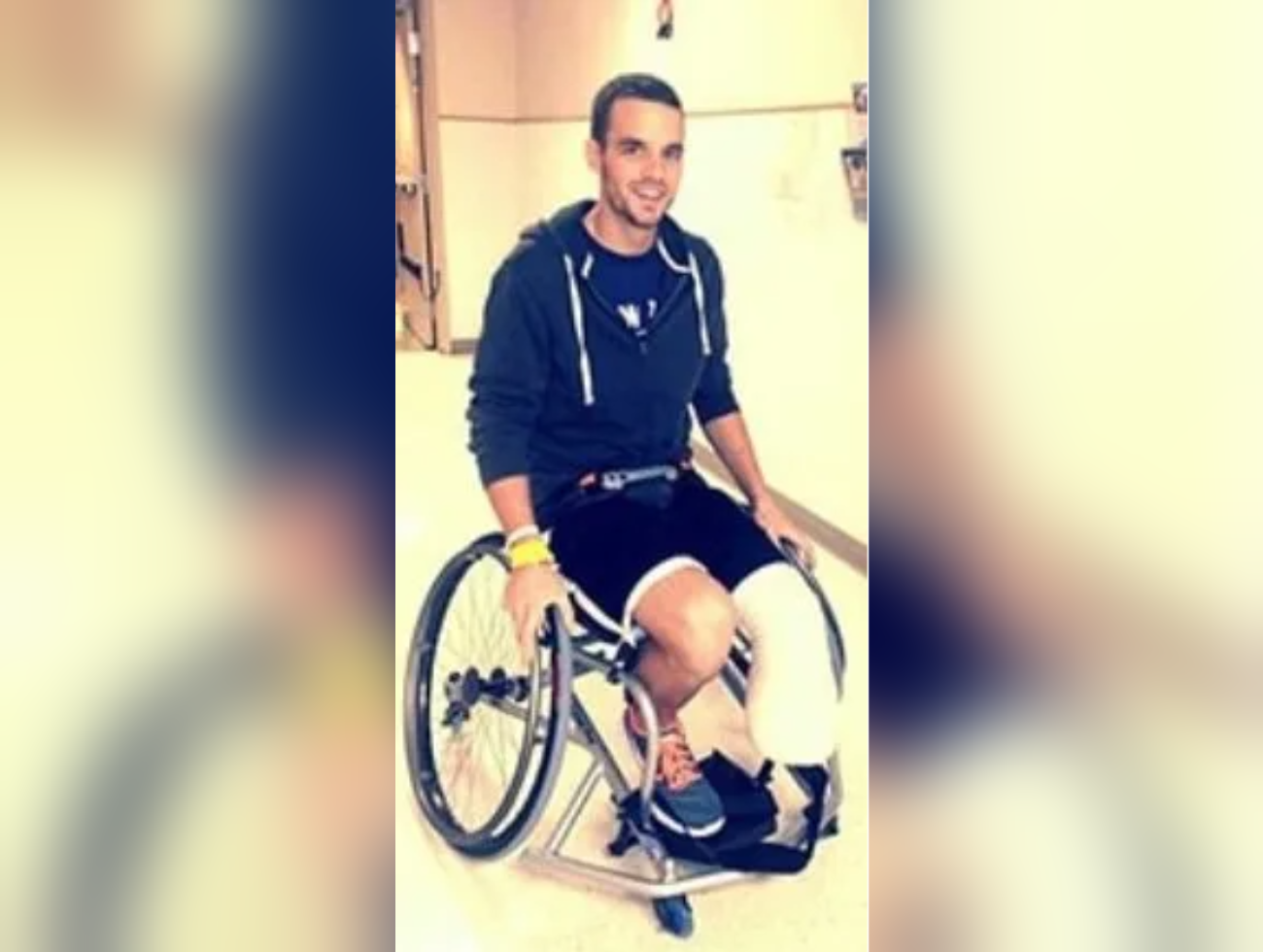 As Uriah Steffen recovered from an accident that left him without his lower left leg, he struggled with depression and thoughts of suicide.
As Uriah Steffen recovered from an accident that left him without his lower left leg, he struggled with depression and thoughts of suicide.
That would make it easier for Angela, he said to himself. “She can go create a new life with somebody else who’s not a mangled mess like I am, who’s not an individual who doesn’t know what independence looks like, who has so many issues of looking in the mirror and can’t decide what he looks like.”
Thoughts of suicide invaded Steffen’s mind. He wondered every day, “if this day would be the day that I ended it. I wanted to make it all go away. I wanted the nightmare to end.”
‘Just hold on a little bit longer’
Steffen is kissing his daughters, 8-year-old Fiona and 6-year-old Vivian, after the sprint triathlon at Eagle Creek Park in august. He is nearly 10 years sober, nearly 10 years past the accident.
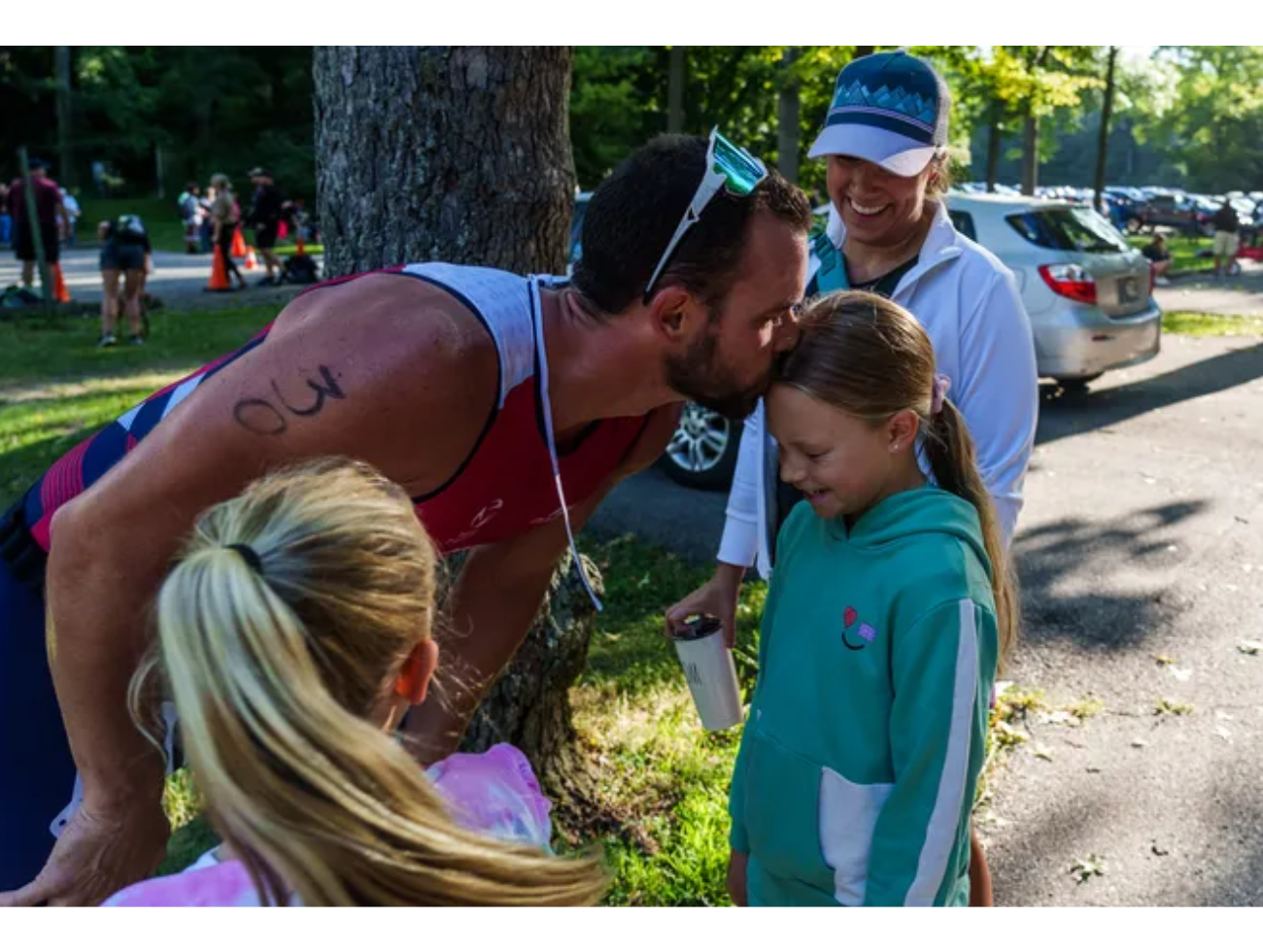 After finishing the sprint triathlon Uriah Steffen gives a kiss to daughter Fiona, 8, as other daughter Vivian, 6, waits her turn Saturday, Aug. 13, 2022, at Eagle Creek Park in Indianapolis. Steffen's wife, Angela, laughs as the girls get covered in sweat.
After finishing the sprint triathlon Uriah Steffen gives a kiss to daughter Fiona, 8, as other daughter Vivian, 6, waits her turn Saturday, Aug. 13, 2022, at Eagle Creek Park in Indianapolis. Steffen's wife, Angela, laughs as the girls get covered in sweat.
The week leading up to the competition, Steffen spent every day training, as he does every week. Swimming, running and bicycling, putting every ounce of himself into his sport.
A triathlon is made up of a half-mile swim, 12.5-mile bike ride and a 3.1-mile run. Steffen is ranked 4th in the United States and, depending on the day, he is ranked 23rd to 28th in the world among all triathletes.
Steffen’s goal is to compete in the 2024 Paralympics in Paris. What got him to that goal, from drowning in depression to looking to monumental fears, Steffen isn’t sure.
“What snapped me out of it, I don’t know if it was a single moment or if it was a combination of a lot of moments that kind of led into one,” Steffen said. “A lot of positive voices feeding into me saying, ‘Hey, you’ve got this. You’re going to be OK. Just hold on a little bit longer.’”
Angela is thankful her husband held on. And the sport he has used to ward off the addictions, she said, is more than OK. It is wonderful.
Because the life Steffen led before was leading nowhere.
His journey to full-blown addiction was an “evolution,” Steffen said. He started drinking his senior year at Fairfield High and then started smoking pot. When he got to Purdue for college in 2005, there were parties everywhere.
“Anywhere you wanted to go, alcohol was available,” he said.
To make money in college, Steffen started delivering pizzas. He made good money, enough money to start trying different drugs. He gave up pot. He really liked prescription pills.
“Pills numbed me. They made me feel like I was on cloud nine and I could accomplish anything,” he said. “I could still talk. I still hided it. I wasn’t this sloppy individual. I could still look in the mirror and say, ‘I know who that is.’”
So Steffen popped pills and he delivered pepperoni pizzas, breadsticks and cheese sauce. He finished delivering pizzas and headed to the bars or home to drink.
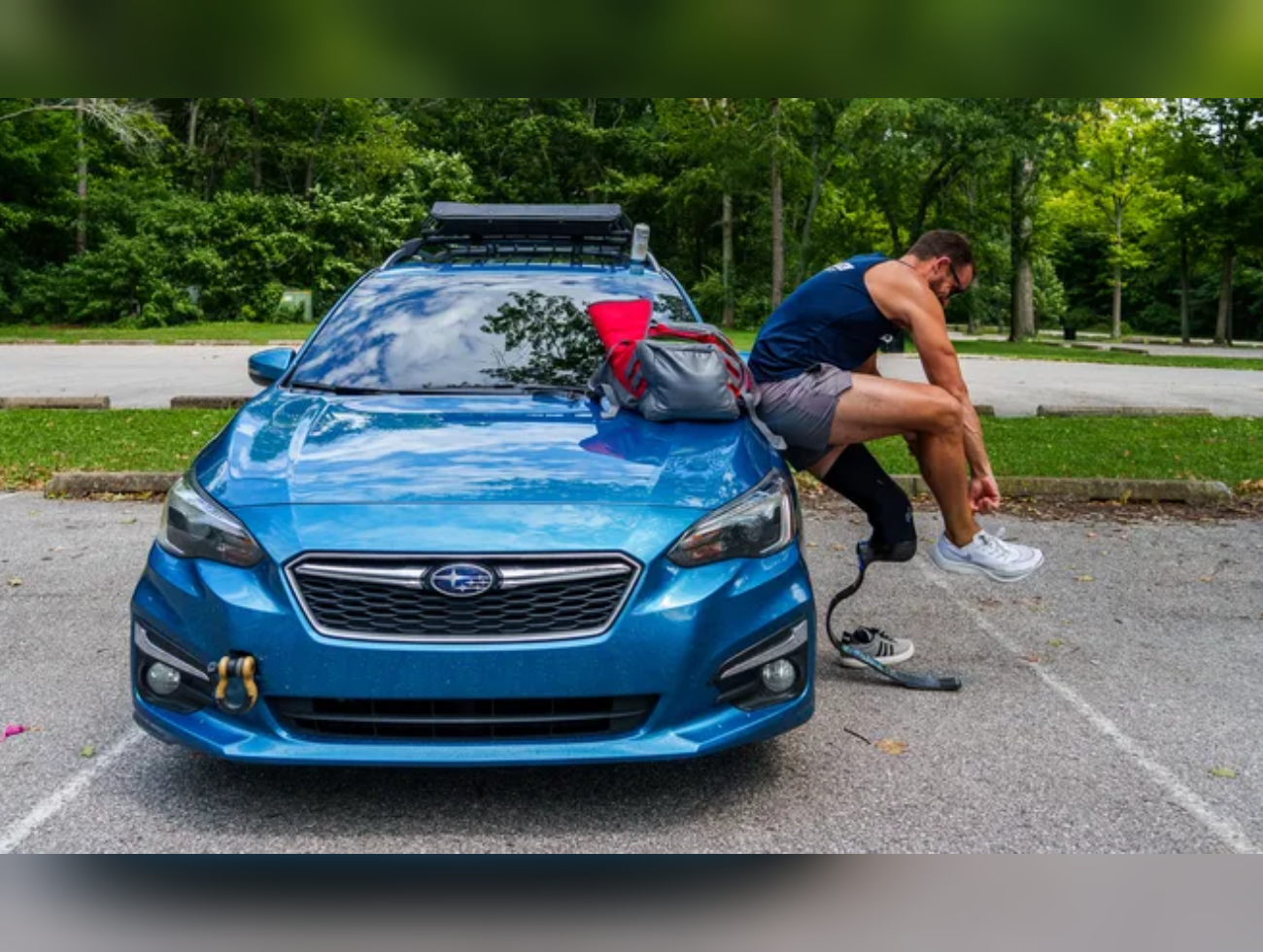 Between appointments at work Monday, Aug. 8, 2022, Uriah Steffen Prepares for a shakedown run at Eagle Creek Park in Indianapolis. The run is to loosen his muscles, after a recent triathlon in Europe.
Between appointments at work Monday, Aug. 8, 2022, Uriah Steffen Prepares for a shakedown run at Eagle Creek Park in Indianapolis. The run is to loosen his muscles, after a recent triathlon in Europe.
“I didn’t care about school at all,” he said. “All I cared about was making money, drinking and getting high.”
Steffen failed out of college and moved to Indianapolis in 2008 to pursue a job in auto restoration. “But the lifestyle I found within that world just fueled my alcohol addiction,” he said.
Through the next three years, Steffen was drunk more than he wasn’t.
He was drunk when he walked into a bar in April 2011 and locked eyes with a woman. Angela was at that bar. A towering 6-5, Steffen, sporting a mohawk and the vibe of a wild punk rocker, sat down next to her.
“He was definitely not my type,” Angela said. But for some reason she started talking to him.
“I don’t know what she saw in me,” Steffen said. “I have no idea.”
‘She watched me getting handcuffed’
The two started dating and Steffen fell in love with everything about Angela. She fell in love with almost everything about Steffen.
Addiction was a new world to Angela, who grew up in a family where an uncle or cousin might smoke cigarettes. She had never seen an alcohol-infused lifestyle of this proportion or what it could mean, but she saw it in September 2011, five months after meeting Steffen.
It was a Saturday morning and Angela was driving to help her dad paint. Steffen was following behind to help with painting, too. He wasn’t supposed to be driving; his license was suspended. A police officer noticed Steffen wasn’t wearing a seatbelt and pulled him over.
Angela pulled into a parking lot to wait for Steffen as the officer looked up his record.
“She watched me getting handcuffed and being put into a police car,” Steffen said. “That was the moment. I can’t hide this anymore. I can’t hide behind this mask.”
Steffen sat in a jail cell for nine hours, he said, until Angela and her uncle came to bail him out. Angela knew she loved Steffen.
 Uriah Steffen and wife, Angela. Steffen chose her over alcohol 10 years ago and their lives were changed forever.
Uriah Steffen and wife, Angela. Steffen chose her over alcohol 10 years ago and their lives were changed forever.
When he asked her to marry him on April 13, 2012, Angela said yes. It was a happy time, one of new beginnings, maybe even getting Steffen to change his ways.
But after the wedding in Las Vegas in July, the alcohol still consumed him. And inside their rented farmhouse, Angela gave him that ultimatum.
Steffen did what he was supposed to do, what he pledged to do. He chose sobriety. And then the accident happened. And sobriety became harder than he ever thought it could be.
A new leg, new beginnings
He still doesn’t know how he survived the head-on collision. Steffen on a bike against a truck. But he did survive and he was left with a new life, a life where he sometimes felt his lower left leg. But knew it wasn’t there.
Steffen wanted desperately for it to be there, to make him feel human again.
In 2014, he got a prosthetic leg. And that started another journey, learning to walk again, ride his bicycle and learning to do the things that come with life – stepping onto a curb, kicking open a door. “I was defining and redefining what independence looked like for me,” Steffen said.
Dr. Whitney Pratt, a rehabilitation physician at IU Health , saw that independence the first day she met Steffen at a clinic for patients with limb loss.
“He stood out,” she said. “First of all, he walked into the clinic, which not a lot of people do. He looked like an athlete.”
As Steffen talked about the tweaks he thought needed to be made to his prosthetic, “it was like he was bringing his car into the shop,” Pratt said. And that was a good thing.
“He had a very positive attitude, but also matter of fact,” said Pratt. She immediately thought that Steffen would be a great person to work with other amputees.
“Really showing what your life can be like,” she said. “He’s so easy to talk to. It doesn’t matter if you’re a 30-year-old athletic person or if you’re a 70-year-old.”
Steffen started working with patients who have limb loss.
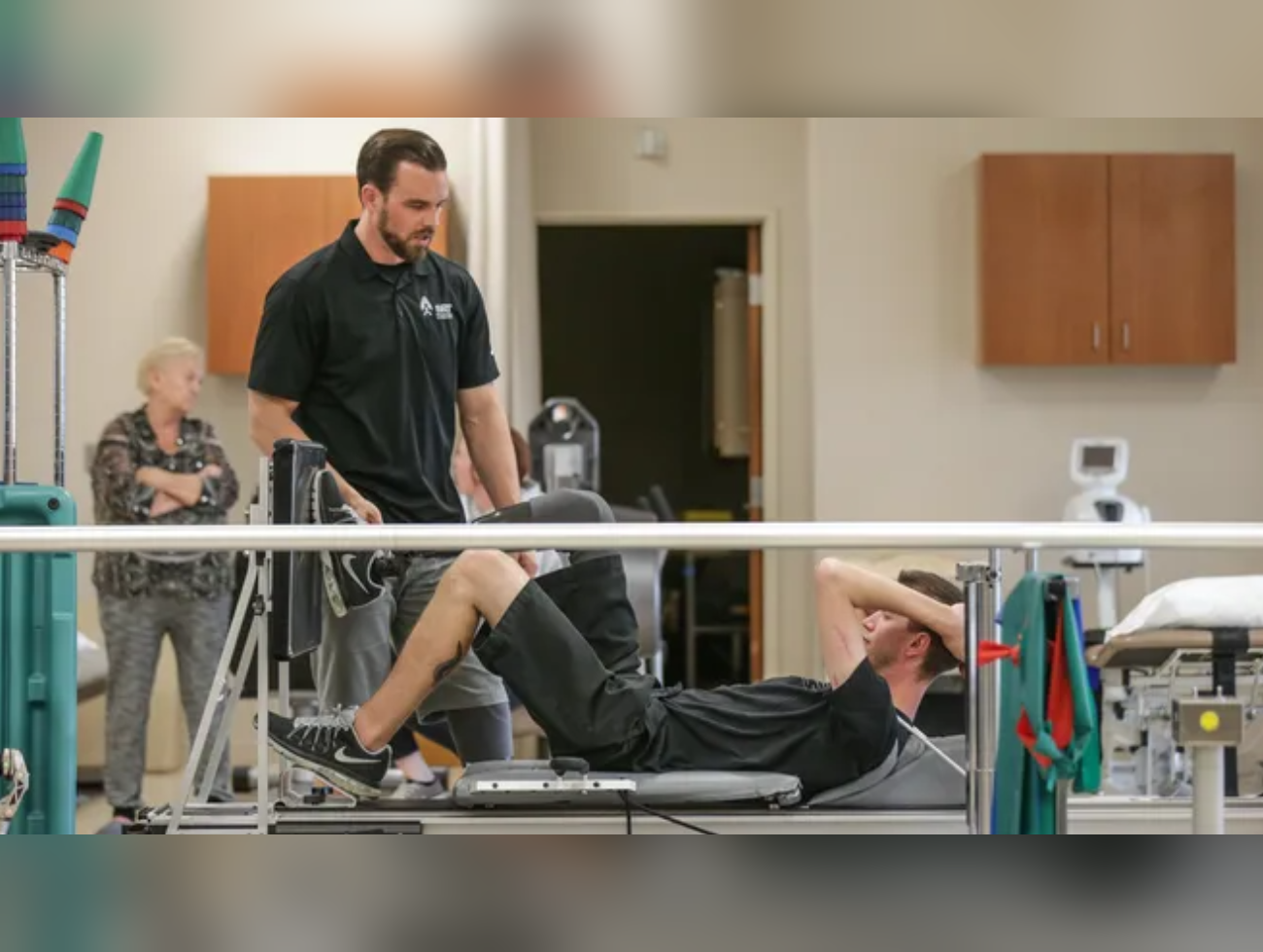 SRT Patient Advocate Uriah Steffen, left, instructs Mark White, right, during his third visit to Amputee Walking School at St. Francis Health, 8050 S. Emerson Ave., in Indianapolis on Monday April 17, 2017.
SRT Patient Advocate Uriah Steffen, left, instructs Mark White, right, during his third visit to Amputee Walking School at St. Francis Health, 8050 S. Emerson Ave., in Indianapolis on Monday April 17, 2017.
“He’s very valuable to me and I do lean on him to talk to patients who are facing amputation or are new amputees,” Pratt said. “They are scared, they may never have met somebody who has an amputation. I definitely rely on Uriah.”
Beyond his people skills, Steffen has a drive, Pratt said.
“It is definitely not common to take it as far has he has been able to take it,” she said. “He was an athletic guy before being injured riding his bike. And that definitely seemed to spur him to new heights.”
To new aspirations in the water, on the bike and running on one foot and one blade – as an elite triathlete.
‘I was hooked’
Steffen grew up around water. He never swam competitively but he certainly knew how to swim.
And the bicycling came easy. That was the mode of transportation that gave Steffen freedom when DUIs kept him from driving a car. On the bike, he felt the weight of the world lifting from his shoulders.
And then there was the running. Steffen could run. It was a way to leave everything in in the past behind.
“So to throw a triathlon together and say, ‘I’m going to try this,’ felt natural and it felt good,” Steffen said. Almost as good as the drugs. No. it felt better than the drugs.
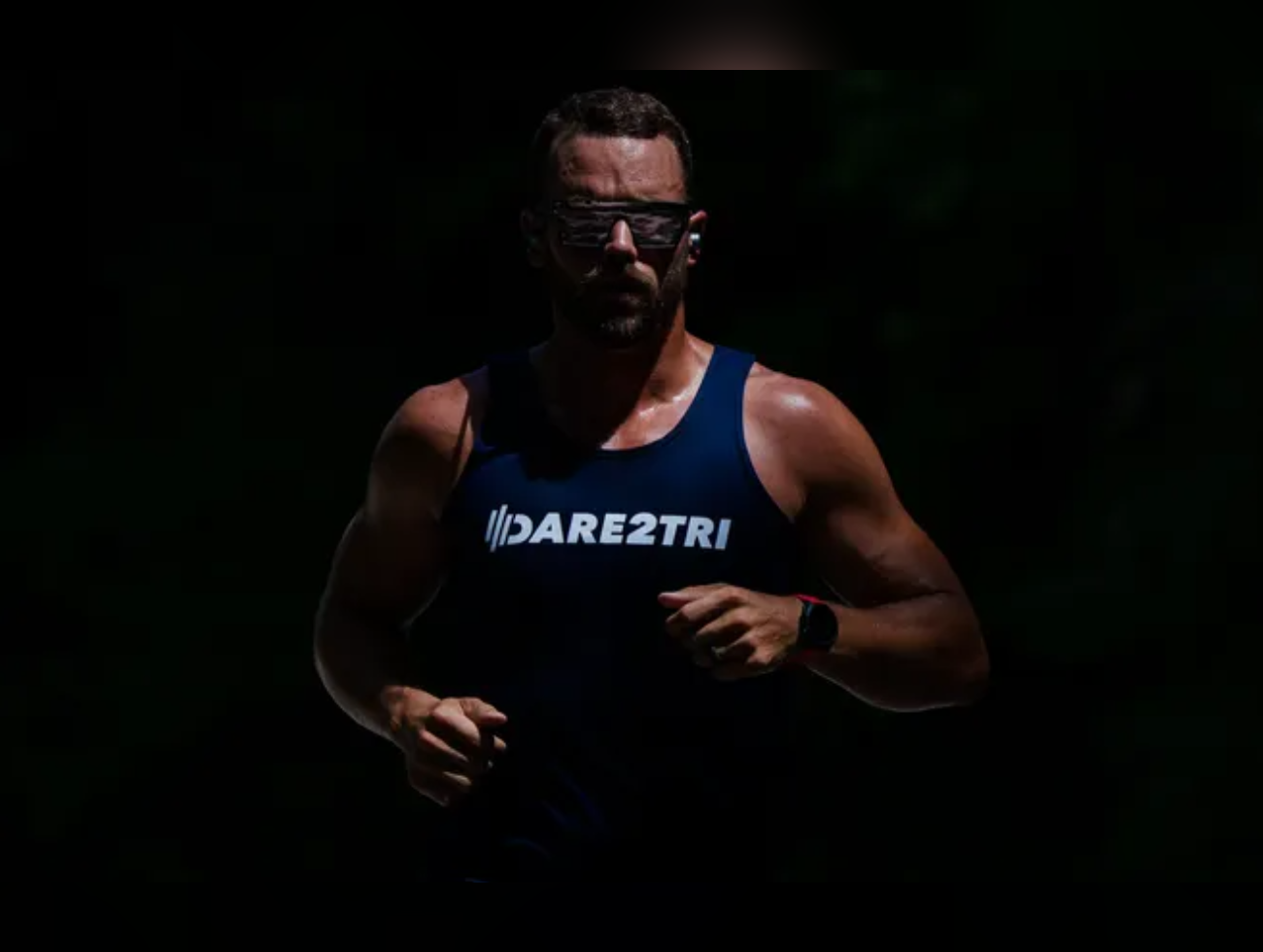 "There's a saying that's once an addict, always an addict, right?" Uriah Steffen said. "And I just shifted my addiction from drugs and alcohol to triathlon, to be active in sports and health."
"There's a saying that's once an addict, always an addict, right?" Uriah Steffen said. "And I just shifted my addiction from drugs and alcohol to triathlon, to be active in sports and health."
His first triathlon was in Brownsburg in May 2018. Steffen placed second in his age group and fell in love with the sport. “I was like, ‘Hey, I can do this,’” he said. “I was hooked.”
Steffen completed in another triathlon in 2018 and then another. And in four years, he catapulted to fourth in the U.S. and one of the top 30 triathletes in the world. He has raced in France, Spain and Great Britain. Just days ago, he finished fourth in the 2022 World Triathlon Para Cup in Portugal.
Which leads to Steffen’s next goal, to compete in the 2024 Paralympics in Paris.
“To have that not just as a dream,” Steffen said, “not just stars, but stars I can touch and see is amazing.”
Especially amazing considering that 11 months ago, in the best shape of his life, Steffen almost died again.
‘My chest was getting ripped apart’
It was a Friday morning in October 2021 and Steffen was at a meeting in Kentucky for his work as a life coach and peer mentor for an orthopedics company, going over finances, drinking coffee and eating a scone.
“I felt like my chest was getting ripped apart,” he said. “I broke into a cold sweat.” Steffen’s arm went numb and it tingled. Steffen excused himself from the meeting to go to the bathroom to splash water on his face.
That didn’t work. Steffen took out his phone to look up his symptoms but couldn’t control his left arm. Using his right fingers, he typed in chest pain, sweat, numbness, tingling. Google told Steffen he was either having a panic attack – or heart attack.
Steffen texted a coworker: I think I’m having a heart attack. The coworker found an off-duty firefighter who was at the meeting. Together, they were dumbfounded. There was no way Steffen was having a heart attack. He was 35 years old, nearly 10 years sober and a triathlete in the best shape of his life.
Still, Steffen went to the hospital in Lexington, just to be sure. During an EKG, he had another heart attack. Yes, doctors told him, this was his second heart attack that morning.
“My chest was being ripped out again, my arm was numb and the pain went from five to 10,” Steffen said.
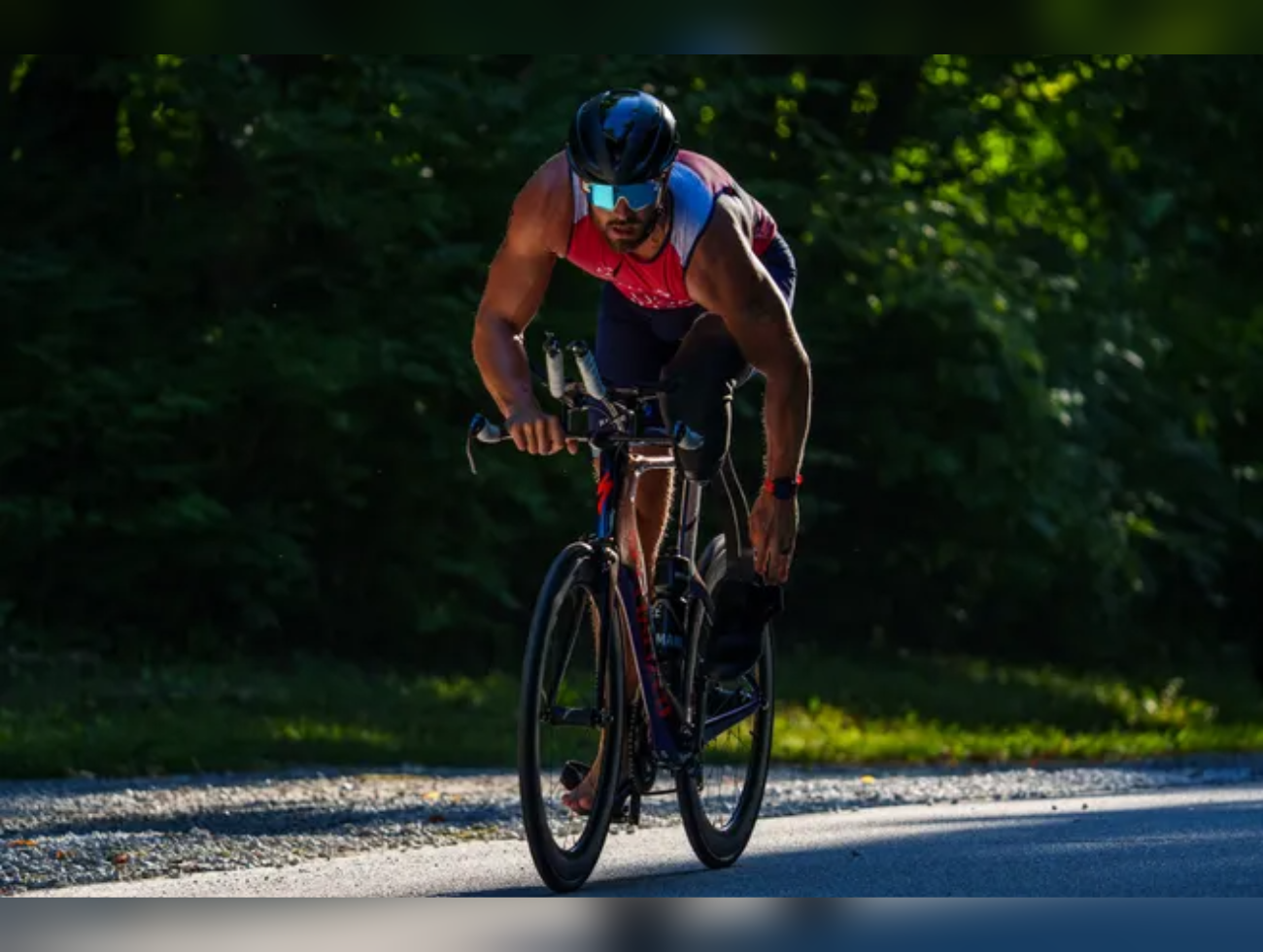 As he comes to the end of the 10-mile bike ride Uriah Steffen begins to unlace his riding shoes Saturday Aug. 13, 2022, before a run to finish the Indianapolis Sprint Triathlon Series at Eagle Creek Park in Indianapolis.
As he comes to the end of the 10-mile bike ride Uriah Steffen begins to unlace his riding shoes Saturday Aug. 13, 2022, before a run to finish the Indianapolis Sprint Triathlon Series at Eagle Creek Park in Indianapolis.
Scans reveled Steffen had three clots blocking 95% of his blood flow. If any one of those clots had dislodged, Steffen would have suffered a “widowmaker,” a heart attack from a blockage in the main artery, a heart attack that is often fatal.
According to the American Heart Association, the survival rate following a “widowmaker” heart attack is 12% when it occurs someplace other than a medical facility. Steffen was put on blood thinners and kept at the hospital for observation.
“Looking back now, I realize the severity of how close to death I was,” he said. Nurses were stationed outside his door. He was always being watched.
When Steffen was released from the hospital and back home in Indy, he went to see cardiologist Dr. Richard Kovacs at IU Health.
Steffen’s No. 1 goal was to get back to competition as a triathlete. Kovacs told him he needed cardiac rehabilitation first. It would prevent a second heart attack.
“It helps you live longer and better no matter who you are,” Kovacs said. “Whether you’re a middle-aged man carrying 20 extra pounds who doesn’t exercise or someone who has aspirations to compete in the Olympics like Uriah.”
Steffen’s rehabilitation was tailored to those aspirations. “He was probably the youngest, fittest person in his rehab class,” Kovacs said. “Then we adjusted it for him and what he wanted to do.”
When Kovacs was sure Steffen’s artery had healed, he gave Steffen the go ahead to train, but not at the levels he normally would.
When the time came to release Steffen to those brutal, everyday workouts – swimming, running and biking – Kovacs brought Steffen in for a stress test.
“It was not like your average stress test,” Kovacs said. “it’s very important, for athletes, that we recreate the workload he’s going to be doing when training and competing. During that stress test, he pedaled like he was in competition.”
And Steffen passed that test and he was back on the triathlon circuit.
‘He just put his head down and kept going’
“What he’s done after his accident has been nothing short of amazing. He’s an inspiration to all of us, even to his somewhat old, grizzled cardiologist,” said Kovacs. “To come back from what he’s come back from and then have a heart attack, he could have let that defeat him.”
“Steffen could have looked at his path to sobriety, his passion to do the right thing, to keep the vow in that farmhouse and wondered why,” Kovacs said. Why did this happen to him. He could have easily gone back to drugs and alcohol.
“But he didn’t,” Kovacs said. “He just put his head down and kept going.”
 "Regardless of the story that we have behind us, we can still change our world and do some incredible things," said Uriah Steffen.
"Regardless of the story that we have behind us, we can still change our world and do some incredible things," said Uriah Steffen.
Angela said that journey has not been easy. “We’ve been through more than some people go through in a whole marriage, a whole lifetime.”
But Steffen choosing her over alcohol and the life they could create 10 years ago, “that is why,” she said.
And why he stayed.
His past isn’t one Steffen tries to hide. Why would he, Steffen said. It made him who he is. He wants others battling and kind of addiction, demon or failure to see his past, his story and see hope.
“Regardless of the story that we have behind us,” Steffen said, “we can still change our world and do some incredible things.”
___________________________
You can find the original article from IndyStar by clicking here!
Contact For More Information
Dana Hunsinger Benbow